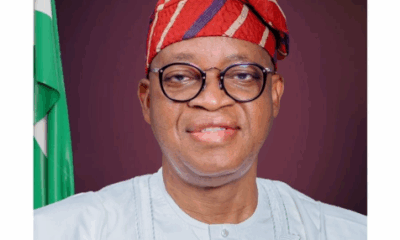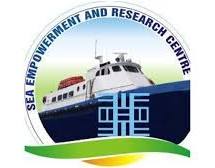Maritime
‘Passage of Port Economic Regulator’s Bill Will Jumpstart Industry Operations Efficiencies’ Akutah
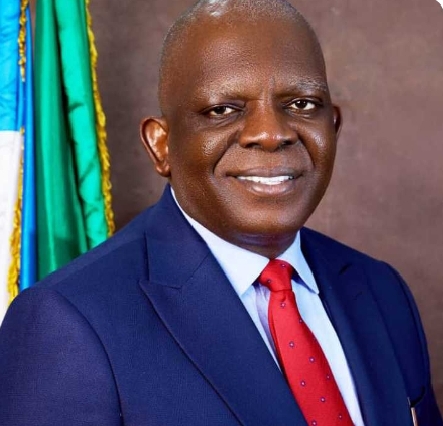
BY EGUONO ODJEGBA
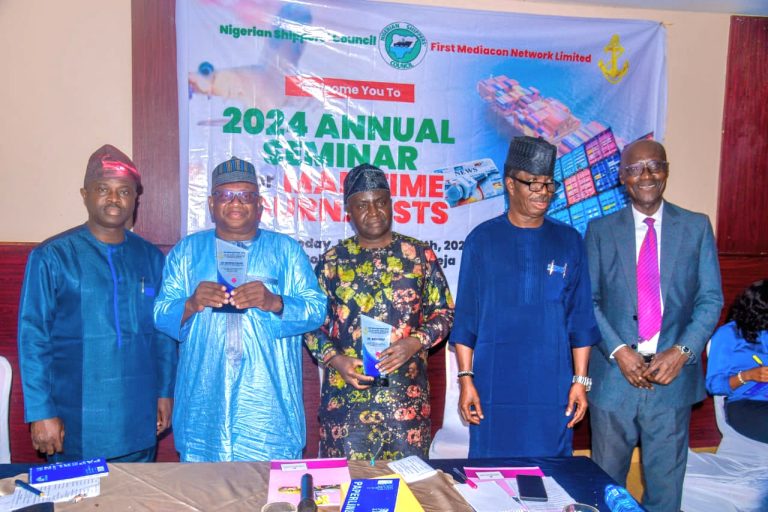
L-R: Muyiwa of Sifax, Zubairu, Dr. Muda, Elder Beks and Onileimon
The Executive Secretary/CEO of the Nigerian Shippers Council (NSC), Barr. Pius Ukeyima Akuta for the umpteenth time has said that challenges presently bogging the port industry operations will loosen hold the moment the protracted obstacles militating against the transformation of the Council as the port economic regulator is finalised and passed into law.
He expressed optimism that with the well meaning assembly of men and women of honour at the National Assembly, the passage of the Nigerian Shipping and Port Economic Regulatory Agency Bill 2023 ,which seek to repeal the Nigerian Shippers Council Act and replace the former will be concluded before too long; even as he appealed to the Nigerian Senate to expedite action on the concurrence of the bill, already passed by the House of Representatives.
Akutah who spoke on Wednesday November 20,2024 at the 2024 edition of the annual Seminar for Maritime Journalists organized by First Medicaon Network Ltd, reiterated that the NSC as presently structured lacks the required legal frame work to discharge its mandates as ports services regulator effectively.
Represented by the Director of Special Duty, Mustapha Zubairu, he explained that even although the NSC was appointed as port economic regulator since 2014 the agency is not sufficiently empowered to enforce compliance, lamenting manifest, subtle and open resistance by various port players and terminal operators.
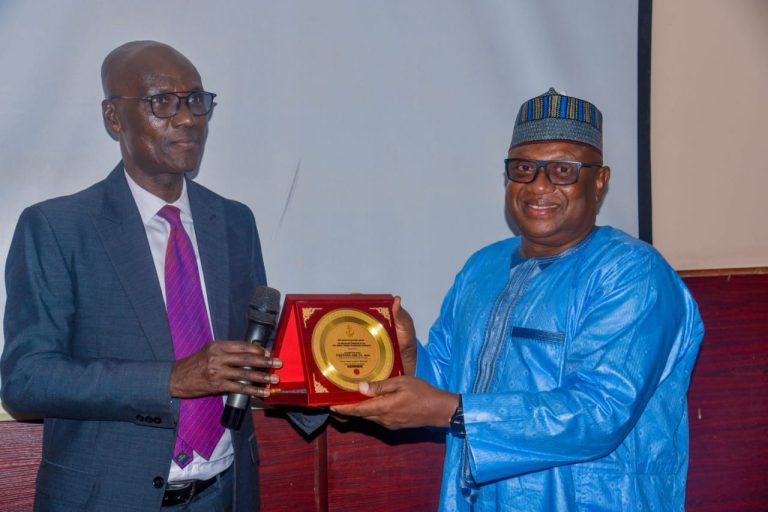
Mr. Onileimon presenting a plaque of appreciation to the NSC Boss, represented
“The Federal Government made the Nigerian Shippers Council the Nigerian Port economic regulator in 2015, but this status need to be formalized through legislation. Therefore, the need for a strong legal framework for the Council as the nation’s Port Economic Regulator is required.
“There is an urgent need for the passage of the Nigerian Shipping and Port Economic Regulatory Agency Bill 2023 which seeks to repeal the Nigerian Shippers Council Act and establish a regulatory agency for the Nigerian ports.”
In addition, he observed that the non appointment of a port economic regulator in 2006 when the Federal Government ceded control of various ports to the private sector in 2014, had left the ports without effective and efficient service regulator.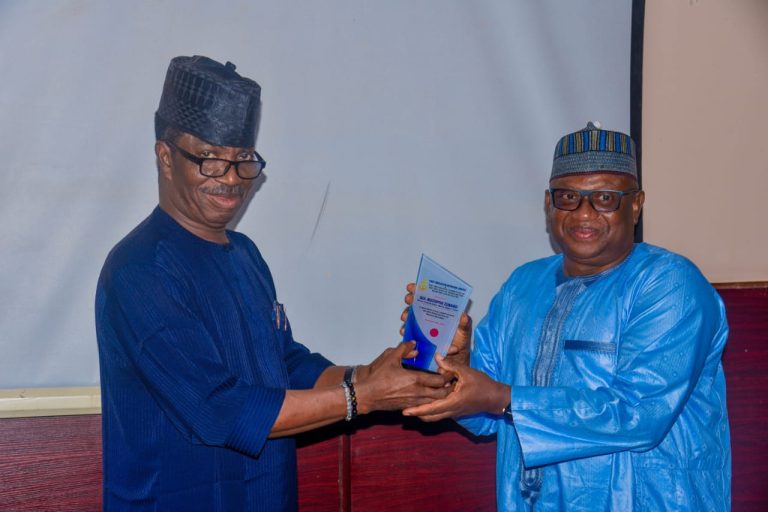
“One of the biggest challenges for the NSC is compliance with its regulatory mandates. At the initial stage of implementing her regulatory functions, the Council encountered some sorts of resistance, particularly from providers of shipping and port services, likewise some Government agencies were not left out.”
He explained that irrespective of the appointment of NSC as port economic regulator, critical players including the Nigerian Ports Authority , Terminal Operators, Shipping Companies ,Freight Forwarders ,Truck haulers and Groupage operators all set their standard of service deliveries, regardless of whether it meets industry quality standard or not, adding:
“The task of making the service providers to comply with the standard rules has become an issue which the NSC is still battling with up till now.”

According to the NCS boss ,the capacity of the regulatory agencies to drive reforms and improve port operations have also been hampered by the broader infrastructural deficits within the port system.
Citing examples, he said the nation’s ports are plagued by poor infrastructural facilities, including outdated cargo handling equipments, inadequate road networks and insufficient storage facilities.
He explained that while the NSC can regulate economic activities, it has limited control over the physical infrastructure, which according to him is largely under the purview of other government regulatory agencies, including NPA, Federal Ministry of Works, Nigeria Railways and private industry investors.
The NSC Executive Secretary also listed lack of coordination among port operators , political interference and bureaucratic bottle necks occasioned by changes in government, shifting of priorities, high cost of business transactions ,as well as port congestion as some of the challenges militating against the industry .
He identified other problems to include limited private sector participation, technological limitations, security and corruption challenges, including cargo theft, piracy and the general atmosphere of lawlessness.
Irrespective of the identified difficulties, Akutah said there are promising prospects for the industry, many of which stem from the ongoing transition in the maritime and logistics sectors.
“The port Economic Regulatory Agency Bill if passed,will empower the NSC to take on more significant regulatory role in Nigerian ports ,overseeing tariffs ,service standards and port efficiency. This would enhance the governance of port operations, improve infrastructure development and ensure fair competition among stakeholders”, he stated.
In his welcome address, Mr. Sesan Onileimo, CEO, First Mediacon Network Limited, facilitator of the training applauded the determination of the executive management of the NSC for giving the Bill all that is required to come to life.
He appealed to stakeholders who are apprehensive of the transformation of the NSC into the Nigerian Port Economic Regulatory Agency to look at the bigger picture and put national interest, first.
“This year, we deliberately narrowed-down our focus to a topic that can offer a dual opportunity for maritime journalists and content owners to acquire knowledge about the emerging dispensation at the NSC, and also understand the apprehension of direct stakeholders about The Nigerian Shipping and Port Economic Regulatory Agency Bill 2023, which is in the last stage of being enacted.
“We commend the determination of the Management of the NSC for giving the Bill all that is required to come to life. The bold move to regenerate the NSC is the motive behind the zeal.”
He continues: “No doubt, the Bill is envisaged to be a game-changer in the Nigerian shipping and port-related businesses. Currently the rating of ease of doing business in the ports is low. It is anticipated that the new law will ensure that there is fairness and competition in pricing of services, while providers and users enjoy a new experience.
“Certainly, its passage and eventually signing into law by the President will usher-in a new dispensation that is yet being imagined.”

